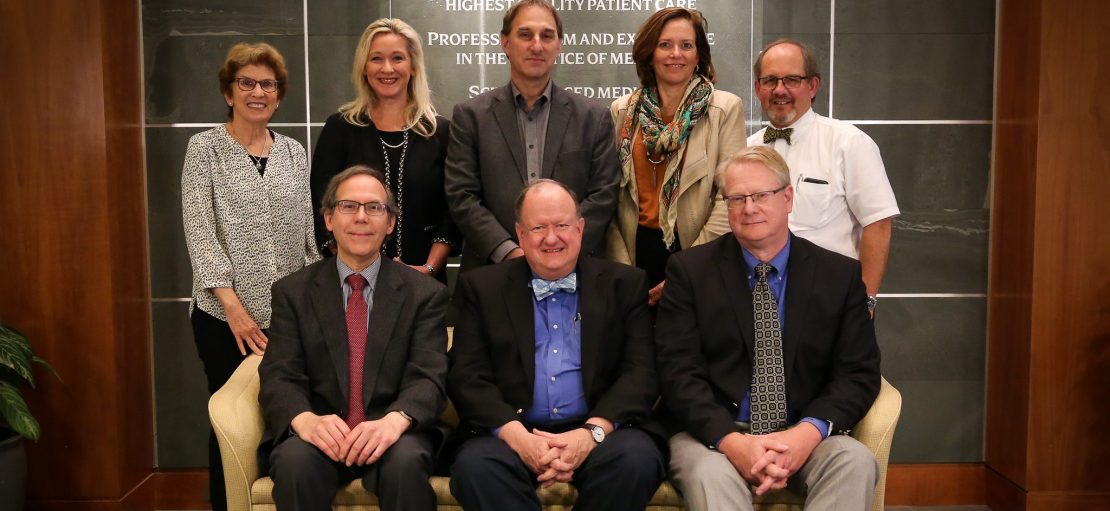Summary Report: Fall 2019 Hematology Board Meeting
November 26, 2019 | Posted by ABIM | ABIM Governance, MOC, News
Meeting Highlights
During our fall meeting, ABIM’s announcement regarding the development of a longitudinal assessment option for Maintenance of Certification (MOC) was a primary focus. We also touched on a number of other key issues for ABIM and the hematology community, and received important updates from ABIM leadership. The following is a report on the highlights of our meeting.
New Members of the Specialty Board
We were pleased to welcome three new members to their first Hematology Board meeting:
- Paul T. Adams, MD is in private practice in Genesee Hematology-Oncology in Flint, MI.
- Beth M. Faiman, PhD, RN is a nurse practitioner in the Department of Hematology and Oncology at the Cleveland Clinic in Cleveland, Ohio.
- Selina M. Luger, MD is Professor of Medicine at the University of Pennsylvania, where she is the Director of the Leukemia Program of the Abramson Cancer Center at the Hospital of the University of Pennsylvania.
Learn more about each of these members by visiting the Hematology Board webpage.
About the Longitudinal Assessment Option
Richard J. Baron, MD, ABIM President and CEO, addressed the Specialty Board and provided an update on the announcement of the longitudinal assessment option, and reactions of society partners and diplomates. He also described ongoing planning activities related to the development of the new pathway and efforts to gain input from the many stakeholders in the physician community.
The longitudinal assessment option is anticipated to be available in 2022 and additional information on its development will be provided at a later date. You are invited to share comments and suggestions here.
Following Dr. Baron’s update and presentations from other ABIM staff on the longitudinal assessment option, the Hematology Board shared their thoughts and discussed how it would work for hematologists.
- The group explored the potential ways societies could collaborate with ABIM to support the educational aspect of the new assessment option.
- Members reflected on the rate of change to the MOC program in recent years, and noted that the recent administration of the Knowledge Check-In in Hematology seemed to be well received by their peers.
Update from the American Society of Hematology
The Hematology Board was joined by two guests from the American Society of Hematology (ASH), Alan E. Lichtin, MD, Chair of the ASH MOC Working Group, and Robby J. Reynolds, ASH Director of Training.
The guests shared an ongoing ASH workforce study intended to preserve and further advance hematology as a specialty. On October 31, ASH published a press release that shared findings from a recent survey in this area, including:
- Reasons why trainees choose careers in hematology
- Opportunities for mentorship during hematology training
- How hematology practitioners spend their time, how they work with the clinical team, and to what extent they experience professional burnout
The workforce study is a part of ASH’s overall efforts to better understand why trainees pursue hematology and suggest ways to ensure a strong pipeline of talent in hematology, specifically non-malignant hematology. Read more about this issue and how ASH has already committed to several initiatives in response.
The guests also touched on the longitudinal assessment and referenced an August 21 ASH press release in which the organization applauded ABIM for exploring the new assessment option, while noting their interest in exploring how ASH’s educational products could be integrated into the pathway.
ABIM’s Board Eligibility Policy and its effect on Hematology
At the spring 2019 Hematology Board meeting members were provided with information on the ABIM Board Eligibility policy:
- In 2012, ABIM defined the Board Eligibility period to be seven years after completing initial certification eligibility requirements, primarily graduation from an ACGME accredited residency and/or fellowship.
- 2019 is the final year of Board Eligibility for all physicians meeting initial certification eligibility requirements on or before 2012, and physicians who have not become initially certified in the last seven or more years will need to complete a year of ACGME accredited training in the relevant discipline in order to register for a future ABIM initial certification examination.
- Hematology has a larger percentage of candidates in the final year of board eligibility than most other specialties.
At the most recent meeting this fall members learned that the vast majority (nearly 90%) of those candidates in the final year of board eligibility for hematology were already certified in medical oncology. This infers that they chose to proceed with achieving certification in medical oncology, but have not done so for hematology. It was also noted that if those who are certified in medical oncology are removed from the Board Eligibility population, the proportion of Hematology-trained physicians who might use up their Board Eligibility falls into line with other ABIM subspecialties.
Specialty Board members and the guests from ASH engaged in a conversation about what this means for the discipline of hematology. The Hematology Board will continue to explore this important finding during its next meeting in spring 2020 and will check the latest data to see if the trend is continuing.
Pre-Fellowship Procedures
The Hematology Board discussed procedural competencies internal medicine residents should have an opportunity to perform before they transition successfully to a hematology fellowship, i.e. pre-fellowship procedures. The concept of “pre-fellowship procedures” came out of the Internal Medicine Board’s decision that all residents must do some procedures, but not all residents must learn the same procedures and Program Directors must make opportunities available to become competent in practice-specific procedures needed for their next level of training. Members decided to engage program directors and the related ASH Standing Committee when this work is explored in the future.
Exam Committee Update
As part of ABIM’s organization-wide effort to enhance the connection between Exam Committees and their corresponding Specialty Boards, the Hematology Board Exam Committee Chair, Anne T. Neff, MD briefed the group on how the Exam Committee work is evolving to meet the demand for more questions for ABIM assessments while maintaining the same quality and rigor. This entails collaborating with ABIM Item-Writing Task Forces whose work contributes to developing content by utilizing an innovative, model-based approach. The Task Forces’ question development techniques involve establishing a set of specifications for creating exam questions for a given content area. These specifications are then used to produce many high-quality questions in a given subject area.
Diplomate Professional Profiles
The Diplomate Professional Profile is currently being updated to include specialty-specific questions. Once it is finalized, diplomates will be asked to complete a periodic survey about the characteristics of their professional activity so that ABIM can assure relevancy of our programs and assessments based on what physicians see in practice. Members reviewed the questions that all diplomates answer on the survey, regardless of specialty. In addition, they reviewed and offered refinements to the hematology-specific questions that all diplomates maintaining certification in hematology will be asked.
In Closing
The Hematology Board welcomes feedback and commentary from diplomates, society partners and the greater medical community. We hope you find this report to be valuable and informative.
Do you have any questions? Are you interested in how to get involved?
If you have questions after reading this report, please connect with us through the following channels:
- Subscribe to blog.abim.org for regular updates
- Call:1-800-441-ABIM (2246)
- Email: request@abim.org
- Join our Governance to help guide our future direction
- Join our Community Insights Network to share your feedback.




